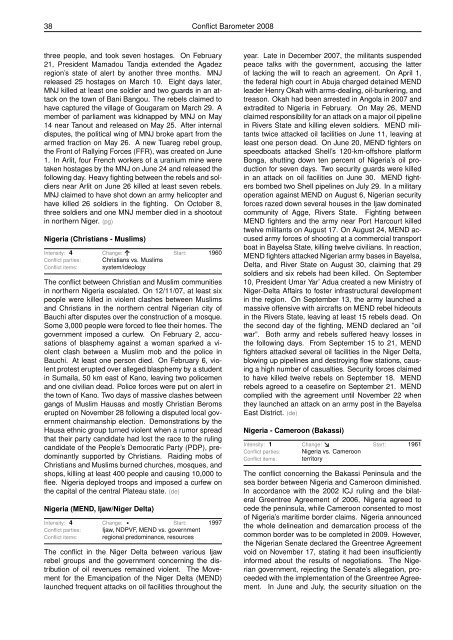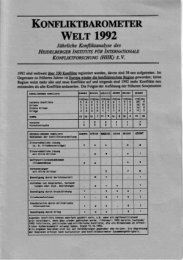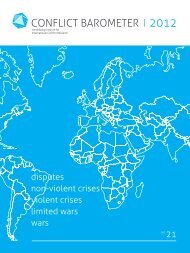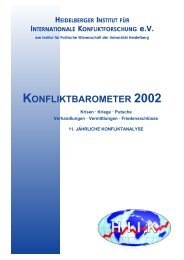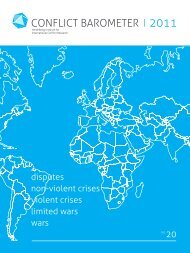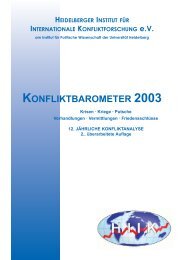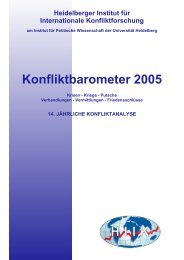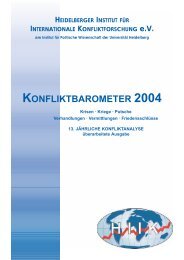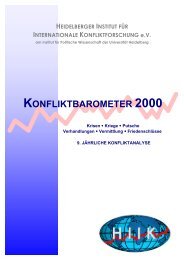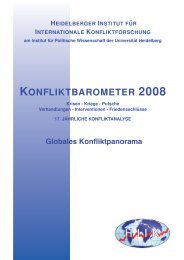CONFLICT BAROMETER 2008
CONFLICT BAROMETER 2008
CONFLICT BAROMETER 2008
Create successful ePaper yourself
Turn your PDF publications into a flip-book with our unique Google optimized e-Paper software.
38 Conflict Barometer <strong>2008</strong><br />
three people, and took seven hostages. On February<br />
21, President Mamadou Tandja extended the Agadez<br />
region’s state of alert by another three months. MNJ<br />
released 25 hostages on March 10. Eight days later,<br />
MNJ killed at least one soldier and two guards in an attack<br />
on the town of Bani Bangou. The rebels claimed to<br />
have captured the village of Gougaram on March 29. A<br />
member of parliament was kidnapped by MNJ on May<br />
14 near Tanout and released on May 25. After internal<br />
disputes, the political wing of MNJ broke apart from the<br />
armed fraction on May 26. A new Tuareg rebel group,<br />
the Front of Rallying Forces (FFR), was created on June<br />
1. In Arlit, four French workers of a uranium mine were<br />
taken hostages by the MNJ on June 24 and released the<br />
following day. Heavy fighting between the rebels and soldiers<br />
near Arlit on June 26 killed at least seven rebels.<br />
MNJ claimed to have shot down an army helicopter and<br />
have killed 26 soldiers in the fighting. On October 8,<br />
three soldiers and one MNJ member died in a shootout<br />
in northern Niger. (pg)<br />
Nigeria (Christians - Muslims)<br />
Intensity: 4 Change: Start: 1960<br />
Conflict parties: Christians vs. Muslims<br />
Conflict items: system/ideology<br />
The conflict between Christian and Muslim communities<br />
in northern Nigeria escalated. On 12/11/07, at least six<br />
people were killed in violent clashes between Muslims<br />
and Christians in the northern central Nigerian city of<br />
Bauchi after disputes over the construction of a mosque.<br />
Some 3,000 people were forced to flee their homes. The<br />
government imposed a curfew. On February 2, accusations<br />
of blasphemy against a woman sparked a violent<br />
clash between a Muslim mob and the police in<br />
Bauchi. At least one person died. On February 6, violent<br />
protest erupted over alleged blasphemy by a student<br />
in Sumaila, 50 km east of Kano, leaving two policemen<br />
and one civilian dead. Police forces were put on alert in<br />
the town of Kano. Two days of massive clashes between<br />
gangs of Muslim Hausas and mostly Christian Beroms<br />
erupted on November 28 following a disputed local government<br />
chairmanship election. Demonstrations by the<br />
Hausa ethnic group turned violent when a rumor spread<br />
that their party candidate had lost the race to the ruling<br />
candidate of the People’s Democratic Party (PDP), predominantly<br />
supported by Christians. Raiding mobs of<br />
Christians and Muslims burned churches, mosques, and<br />
shops, killing at least 400 people and causing 10,000 to<br />
flee. Nigeria deployed troops and imposed a curfew on<br />
the capital of the central Plateau state. (de)<br />
Nigeria (MEND, Ijaw/Niger Delta)<br />
Intensity: 4 Change: Start: 1997<br />
Conflict parties: Ijaw, NDPVF, MEND vs. government<br />
Conflict items: regional predominance, resources<br />
The conflict in the Niger Delta between various Ijaw<br />
rebel groups and the government concerning the distribution<br />
of oil revenues remained violent. The Movement<br />
for the Emancipation of the Niger Delta (MEND)<br />
launched frequent attacks on oil facilities throughout the<br />
year. Late in December 2007, the militants suspended<br />
peace talks with the government, accusing the latter<br />
of lacking the will to reach an agreement. On April 1,<br />
the federal high court in Abuja charged detained MEND<br />
leader Henry Okah with arms-dealing, oil-bunkering, and<br />
treason. Okah had been arrested in Angola in 2007 and<br />
extradited to Nigeria in February. On May 26, MEND<br />
claimed responsibility for an attack on a major oil pipeline<br />
in Rivers State and killing eleven soldiers. MEND militants<br />
twice attacked oil facilities on June 11, leaving at<br />
least one person dead. On June 20, MEND fighters on<br />
speedboats attacked Shell’s 120-km-offshore platform<br />
Bonga, shutting down ten percent of Nigeria’s oil production<br />
for seven days. Two security guards were killed<br />
in an attack on oil facilities on June 30. MEND fighters<br />
bombed two Shell pipelines on July 29. In a military<br />
operation against MEND on August 6, Nigerian security<br />
forces razed down several houses in the Ijaw dominated<br />
community of Agge, Rivers State. Fighting between<br />
MEND fighters and the army near Port Harcourt killed<br />
twelve militants on August 17. On August 24, MEND accused<br />
army forces of shooting at a commercial transport<br />
boat in Bayelsa State, killing twelve civilians. In reaction,<br />
MEND fighters attacked Nigerian army bases in Bayelsa,<br />
Delta, and River State on August 30, claiming that 29<br />
soldiers and six rebels had been killed. On September<br />
10, President Umar Yar’ Adua created a new Ministry of<br />
Niger-Delta Affairs to foster infrastructural development<br />
in the region. On September 13, the army launched a<br />
massive offensive with aircrafts on MEND rebel hideouts<br />
in the Rivers State, leaving at least 15 rebels dead. On<br />
the second day of the fighting, MEND declared an ”oil<br />
war”. Both army and rebels suffered heavy losses in<br />
the following days. From September 15 to 21, MEND<br />
fighters attacked several oil facilities in the Niger Delta,<br />
blowing up pipelines and destroying flow stations, causing<br />
a high number of casualties. Security forces claimed<br />
to have killed twelve rebels on September 18. MEND<br />
rebels agreed to a ceasefire on September 21. MEND<br />
complied with the agreement until November 22 when<br />
they launched an attack on an army post in the Bayelsa<br />
East District. (de)<br />
Nigeria - Cameroon (Bakassi)<br />
Intensity: 1 Change: Start: 1961<br />
Conflict parties: Nigeria vs. Cameroon<br />
Conflict items: territory<br />
The conflict concerning the Bakassi Peninsula and the<br />
sea border between Nigeria and Cameroon diminished.<br />
In accordance with the 2002 ICJ ruling and the bilateral<br />
Greentree Agreement of 2006, Nigeria agreed to<br />
cede the peninsula, while Cameroon consented to most<br />
of Nigeria’s maritime border claims. Nigeria announced<br />
the whole delineation and demarcation process of the<br />
common border was to be completed in 2009. However,<br />
the Nigerian Senate declared the Greentree Agreement<br />
void on November 17, stating it had been insufficiently<br />
informed about the results of negotiations. The Nigerian<br />
government, rejecting the Senate’s allegation, proceeded<br />
with the implementation of the Greentree Agreement.<br />
In June and July, the security situation on the


